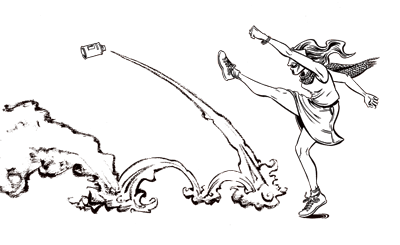Now and then I will post short entries about Theo’s tattoos – not the scholarly treatment they deserve, just a little background information. Because the tattoos have to be roughly the same every time I draw them, and on roughly the same part of the body, I had to plan them out fairly carefully – though if it had occurred to me at the outset how many times I’d have to draw them, I would have planned them even more carefully. My friend Ben Bates, who draws Sonic the Hedgehog for Archie comics (among with many other things) and who has one of the keenest minds for character design I’ve ever come across, says that having a character covered in tattoos who spends most of the comic shirtless is already in itself a horrible idea. I totally agree, but unfortunately for me and my right hand, it’s also crucial to the plot.
On the underside of Theo’s left forearm is the instantly recognizable Tetragrammaton. No, that’s not some kind of giant Japanese robo-warrior, it’s the Hebrew four-letter name for God. Because this word is all consonants, with the vowels varying or implicit, there’s a lot of confusion as to how it ought to be pronounced. But this isn’t actually a problem, since to Jews “The Name” is actually too sacred to be pronounced, except perhaps by one person in one particular place, once, on one particular day of the year… and even that, not so much lately. Needless to say, getting this tattooed on your arm is probably pretty risque, if not downright offensive, since Judaism does not generally allow tattoos of any sort in the first place.
It’s possible, however, that Theo got the tattoo when he was a Christian. After all, the Christians use many of the same texts – whenever you see the phrase “the LORD” in all capitals in an English-language bible, it often holds the place of the tetragrammaton (although the frequent Hebrew euphemism “Adonai” is also translated as “Lord”). This brings me to an Interesting Personal Anecdote:
I’m thrilled to be singing in the 13th Annual William Byrd Festival with the early music choir Cantores in Ecclesia. At one service we will be chanting Psalm 68, which contains the line “magnify him that rideth upon the heavens as it were upon an horse; praise him in his Name, JAH, and rejoice before him.” Here, “Jah” is a shortened, two-letter version of the Name (incidentally, a root of the word “Hallelujah,” and name of God used by Rastafarians). This is the only instance of the name “Jah” in the entire King James Bible. For some unfathomable reason, it was translated as “JAH” just this one time. Unsurprisingly, we singers are baffled as to how to pronounce it.





